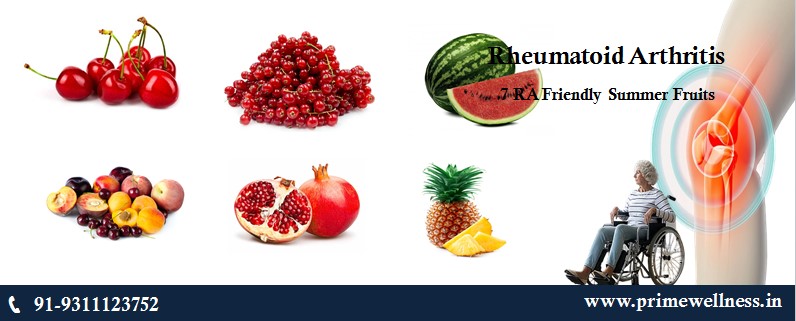
7 Rheumatoid Arthritis-Friendly Summer Fruits
There's no better time than summer to start including these fresh fruits in your RA-friendly diet. They're high in nutrients and antioxidants, which can aid in the fight against inflammation.
Summer is the season of fresh fruits. If you have rheumatoid arthritis (RA), take advantage of the seasonal abundance and increase your consumption — fruits are high in antioxidants, vitamins, and polyphenols (organic compounds found in plants), all of which help reduce oxidative stress and inflammation.
Don't Be Concerned About Sugar
Many people believe that because fruits contain sugar, they should be avoided. "However, there is a significant difference between a piece of chocolate and a piece of fruit." Yes, every carbohydrate is converted into sugar. Fruits, on the other hand, have different properties such as vitamins, minerals, fibre, and phytonutrients that can lower your risk of inflammation, whereas a piece of chocolate is just added sugar with a lot of calories but fewer nutrients."
7 Delicious Fruits That Help with Rheumatoid Arthritis
1. Cherries
According to a 2018 review published in Nutrients on the health benefits of cherries, they're a good source of polyphenols and vitamin C, both of which have antioxidant and anti-inflammatory properties. Cherry consumption "decreased markers for oxidative stress in 8/10 studies; inflammation in 11/16; exercise-induced muscle soreness and loss of strength in 8/9; blood pressure in 5/7; arthritis in 5/5; and improved sleep in 4/4," according to the researchers. Another piece of good news is that, contrary to popular belief, sweet cherries are just as effective as tart cherries in producing these effects.
Try It: Simply freeze them and eat them as a snack. Make a chia pudding (1 cup almond milk, 1/4 cup chia seeds, 1 tablespoon maple syrup, 2 teaspoons cocoa powder) and add half a cup of cherries, suggests Frechman. Chia seeds also provide fibre.
2. Peaches, Stone Fruits, and Citrus
Fruits with stones (peaches, apricots, plums) and citrus fruits (lemons, oranges, limes) are high in vitamin C, an antioxidant and anti-inflammatory. According to the Arthritis Foundation, canned peaches in light syrup have more vitamin C than fresh peaches.
Try It: Make a hazelnut milk smoothie with a variety of these fruits and some canned peach juice. Alternatively, enjoy a fresh fruit salad with a hint of mint. Don't forget to zest the citrus rinds, which are high in antioxidants. Sprinkle them on top of a salad, in salad dressing, or in the batter of a blueberry crumble.
3. Pomegranates
Pomegranates can "manage RA complications by reducing inflammation and oxidative stress," according to a review published in The International Journal of Clinical Practice in 2021. Why? Pomegranates are a good source of polyphenols, which are antioxidants. They also have vitamin K, which helps to reduce joint swelling and build cartilage and bone.
Try It: Pomegranates can be difficult to deseed, but stores now sell them with the seeds already removed. Mix them into a salad dressing or add them to a fresh spinach and feta cheese salad. Alternatively, combine them with some fizzy water to make a pomegranate spritzer.
4. Berries and Currants
According to a review published in Food and Function in 2018, berries are not only high in antioxidants but also high in polyphenols such as anthocyanins (pigments found in certain plants that produce the red, blue, or purple colour) and quercetin, as well as various types of phenolic acids that reduce inflammation.l
Try It: For a filling snack, combine them with yoghurt and granola. Alternatively, Frechman suggests sautéing them into a sauce to serve with fish or chicken. In a saucepan, combine the fruits with the balsamic vinegar, maple syrup, and thyme, and cook over low heat for 3 to 4 minutes, or until the mixture thickens. Keep a bag of frozen berries on hand at all times, and you'll be ready for anything.
5. Pineapple
"Pineapples are high in vitamin C, but they also contain the protease enzyme bromelain." "It has the potential to reduce inflammation, support the immune system, and help with digestion," says Frechman.
Try It: Make pineapple chunks and skewer them. Grill until lightly charred with a little olive oil. The sugar caramelises, creating a truly delicious experience. Make a pineapple salsa to serve with chips or to top chicken or fish. Frechman suggests chopping pineapple, red pepper, and cilantro, then adding lime juice and a pinch of jalapeo for heat.
6. Watermelon
According to Frechman, this thirst-quenching fruit is bursting with citrulline, lycopene, polyphenols, and vitamins A and C, all of which have strong antioxidant properties and may help promote joint health. According to a 2020 Molecules article, watermelons can also help with other diseases and conditions such as diabetes, cancer, and obesity.
Try It: There's no need to get fancy. Simply cut it up and eat it. Blend it with a little lime juice to make refreshing (and healthy) frozen pops.
7. Grapes
White and darker-colored grapes, according to the Arthritis Foundation, are both high in antioxidants and polyphenols. Fresh red and black grapes contain resveratrol, a natural polyphenol with anti-inflammatory and anticancer properties.
Try It: Keep them frozen for a tasty snack. Skewer them with chicken or fish, marinate them, and then grill. For a fun parfait, layer them with yoghurt and almonds.
Go for a Variety
Change it up: "Fruits and vegetables contain hundreds of different phytonutrients, so eat a variety to reap all of the benefits," says Frechman.
Bon appetite!





